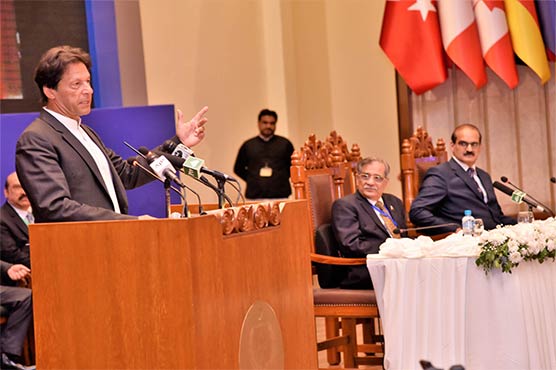On 6 December 1992 tens of thousands of Hindu fanatics had gathered at Babri Masjid site and demolished it. On that fateful day, top leaders of the right-wing Hindu Bharatiya Janata Party (BJP) – the party now in government – gathered in Ayodhya in what is said to be a well-planned conspiracy to demolish an historic monument that was part of the cultural and archaeological heritage of the Indian people. That the BJP was involved in the demolition of the Babri Masjid is clear. Leaders including L. K. Advani, Uma Bharti and scores of other major and minor figures faced conspiracy charges. Despite passage of 28 years neither action has been taken against those who were instrumental in demolition of the Babri Mosque nor against those who were responsible for more than 2000 deaths. Anyhow, Allahbad High Court had given the controversial verdict.
Supreme Court has yet to give the verdict on the appeals against the verdict of the Allahbad High Court, which had given the formula to divide the site in three parts. On 25th November 2018, huge crowds of saffron-clad protesters, some waving swords and chanting “praise be to Ram”, massed in Ayodhya, Uttar Pradesh state, where right-wing Hindu groups wanted a grand temple to be built on the site where the Babri Mosque once stood. Many Hindus claim a spot there marks the birthplace of Ram and allege that the Babri Mosque, which stood there for 460 years, was built after the destruction of an earlier temple. The site remains a flashpoint between Hindus and the country’s sizeable Muslim minority and the show of force by Hindu hardliners came two weeks before the 26th anniversary of the mosque’s destruction, asking the Parliament to pass the law to construct Ram Mandir.
Some extremist groups are exerting the pressure on Prime Minister Narendra Modi over the issue ahead of general elections in the next six months. The Bharatiya Janata Party (BJP) Narendra Modi leads is a Hindu nationalist outfit with ties to some of the hard line groups rallying in Ayodhya, including the Vishwa Hindu Parishad (VHP) and Shiv Sena. VHP leader Champat Rai told demonstrators they would only accept “the entire area” for the Ram temple and would not consider sharing the site with Muslims.
Supreme Court was to start final hearing to adjudicate Ram Janmabhoomi-Babri Masjid dispute on 5th December 2018. A batch of 13 appeals had been filed in the top court against the Allahabad High Court verdict that directed division of 2.77 acres of land of the disputed Ram Janmabhoomi-Babri Masjid site in Ayodhya into three parts.
A Special bench of Justices Dipak Misra (CJI), Ashok Bhushan and S. Abdul Nazeer will begin the final hearing of the case. One does not understand that when Liberhan Commission report is there, it should also indict those who were responsible for the riots. On December 1992, Liberhan commission was set up by the Government of India to probe the circumstances that led to the demolition of the Babri Masjid. It was the longest running commission in India’s history with several extensions granted by various governments. In 17 years of its proceedings, the commission recorded statements of several politicians, bureaucrats and police officials including Kalyan Singh, late Narasimha Rao, former deputy prime minister L.K. Advani and his colleagues Murli Manohar Joshi and Uma Bharati as well as Mulayam Singh Yadav. The report stated in unambiguous terms that the demolition of the Babri Masjid was planned and systematic.
It went on to state that it was the intended outcome of a climate of communal intolerance deliberately created by the Sangh Parivar and its sister affiliates including the Bharatiya Janata Party. Justice Manmohan Singh Liberhan went on to state: “It cannot be assumed even for a moment that L.K. Advani, A.B. Vajpayee or M.M. Joshi did not know the designs of Sangh Parivar. Though these leaders were deemed and used by the Parivar to reassure the cautious masses, they were in fact party to the decisions which had been taken.” The report had accused the RSS of being the chief architect of the demolition. Justice M.S. Liberhan termed Atal Bihari Vajpayee, L.K. Advani, Murli Manohar Joshi as pseudo-moderates, pretending to keep a distance from the Ram Janambhoomi campaign when they were actually aware of the whole conspiracy. In view of these facts, the Supreme Court should not have taken so long to give its verdict.



